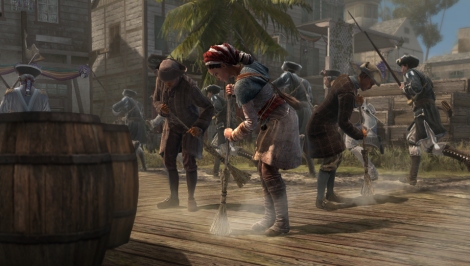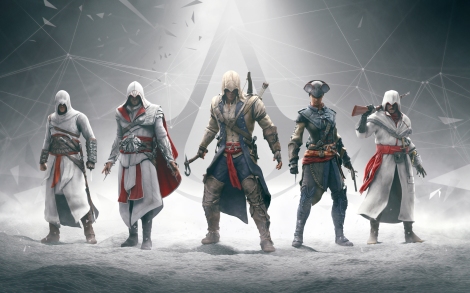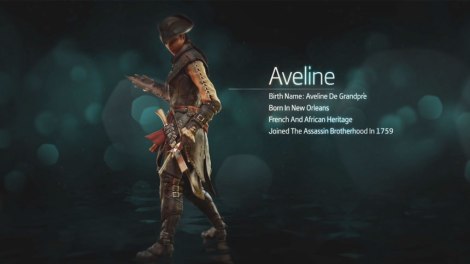The question of identity takes some special consideration when we talk about a series where a narrator literally changes his identity. In Assassin’s Creed, you can not only play as Desmond Miles, a modern day assassin, but also has several of his ancestors, or you can play as an assassin of the past without any relation to a modern assassin like in the case of Aveline de Grandpré.
Not only does Desmond see the world from the eyes of his ancestors, but he also experiences the culture of the historical world from their eyes.
The most important part their identities is what connects them. Sure they share the same blood line, but more specifically they abide by the creed of the Assassin Brotherhood. They are not anonymous beings, but part of an organization. That organization is what fuels them and it is what keeps the story of Desmond and his ancestors so interesting. Not only does the series present compelling new characters, but they also able to interlace the stories.

The object of the Animus allows the player to experience the world through the eyes of someone else doubly. Through the eyes of Desmond, we are able to see the world of Altaïr, Ezio, and Connor. Those identities give the player a completely new personality and environment to work out of. However, the most drastic change for the player, is the addition of Aveline de Grandpré. In my opinion this not only evolved the identity of an assassin, but also allowed for a completely new change.
Not to mention the fact that we are now put in a new place, AC 3: Liberation brings us a completely new character outside of Desmond’s family line. There is some interaction with Connor, but not enough to really make an impact. Instead, Aveline is on a mission of her own and she is armed with a special set of tools.
Right off the bat, there is a change in the identity of Aveline’s character. Altaïr was a man comfortable in his time, distant but comfortably situated socially. Ezio was born into a wealthy Italian family, and although he was constantly surrounded by templars, he made easy allies all through out Italy and later all over the world. However, with Connor we saw a change. From mixed blood, both English and Native American, he struggled with his identity and it showed throughout the game.
Aveline suffers the same thing, but where Connor’s struggle impairs his ability to complete tasks and even his ability to act as an assassin, her race and gender plays major benefits. This plays off a very interesting change in gameplay. Instead of giving Aveline the same abilities as Ezio or Connor, Aveline has a completely new set of abilities that are focused around her race and her gender. A daughter of a white man and a black woman, she is able to go undercover as a slave to mix in with the crowd in the Bayou where her lady costume would be out of place. In the city, she is able to curry respect from the locals and charm guards in her disguises as a lady. And in her assassin’s garb, she is able to take back the city and reveal the secrets of her order.

Aveline spends much of the story on her own, separated from too much romantic plotting, but there can be no doubt that she knows how to use everything to her benefit. It is an interesting change, especially since often women can not enter a story in video games or even in other forms of media, without becoming an object of romantic desire and be pigeon holed into that role.
It leads an interesting question as to who is the audience behind this game. The protagonist of the Assassin’s Creed games are important to the story, and are not racially or sexually interchangeable. There is no male Aveline that someone can play, and yet the creators have chosen to take a game that has been marketed towards mainly males, and make the new game protagonist female.

However, there are some problems with this. The first and largest problem being that the game was only available on the Playstation Vita. It was a new system, and the game being only available on the handheld definitely held back the outreach of the game. The second problem is that Aveline didn’t have her Desmond. There was no one attached to the game, and while some found that refreshing, I felt like I lost a crucial part of the game.
The series has been about interconnectivity. It’s important. And what is even more important is the connection of a previous assassin with our modern ones. Why were there no references to what happened at the end of Assassin’s Creed 3? Other than a brief encounter with Connor, we don’t get much more. Is the subject descended from Aveline part of the program? Has the Animus been commercialized? These are all important questions that are presented when we play the game. Throwing someone into this game who has spent the last years learning the ins and outs of the previous games, there is something missing.
I applaud Ubisoft for doing what they did with Aveline. They not only utilized the minority qualities of Aveline, but also manipulated them in her favor. To gender wash over Aveline giving her only abilities that the other white male protagonists have would have been foolish. She’s a woman in a very political part of the South, and not only is her identity a controversy, but we are stuck right in the middle of it. Her identity makes wish for more female protagonists with such interesting gameplay options and identities behind them.

